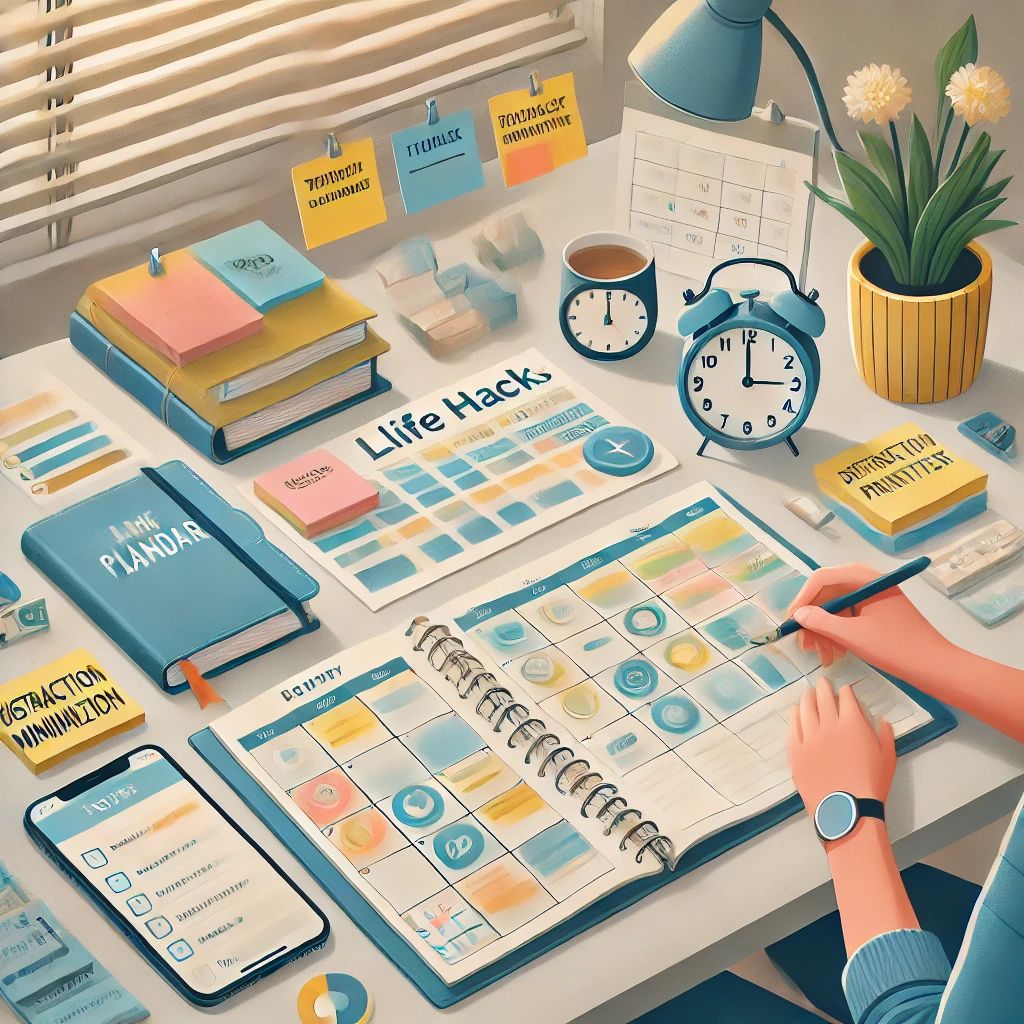
Why Time and Task Management is Important
In today’s busy world, it’s easy to feel overwhelmed by a growing to-do list and constant deadlines. Effective time and task management is essential for productivity, reducing stress, and achieving personal and professional goals. With the right strategies in place, you can streamline your tasks, stay organized, and make the most of each day. Here are some practical life hacks to help you master time management and stay on top of your to-do list.
1. Use the Time-Blocking Method
Time-blocking is a powerful technique to help you organize your day:
Schedule your tasks: Break your day into blocks of time and assign specific tasks to each block. This helps you stay focused on one task at a time and prevents multitasking.Prioritize high-value tasks: Block time for your most important tasks during the hours when you’re most productive. This ensures that you tackle priority work when you have the most energy and focus.Include breaks: Don’t forget to block time for short breaks to recharge. This improves focus and prevents burnout.2. Create a Daily To-Do List
A to-do list helps you stay organized and focused:
Write it down: At the start of each day, write down the tasks you need to accomplish. Organizing your thoughts on paper helps you prioritize and avoid forgetting important tasks.Use the 1-3-5 rule: Break your list into one big task, three medium tasks, and five small tasks. This makes your list manageable and ensures you don’t overload yourself with too many high-priority tasks.Check off tasks as you complete them: Crossing off completed tasks gives you a sense of accomplishment and keeps you motivated throughout the day.3. Set SMART Goals
Setting SMART (Specific, Measurable, Achievable, Relevant, Time-bound) goals helps you stay focused and productive:
Be specific: Clearly define what needs to be done. Vague goals lead to unclear priorities and wasted time.Measure progress: Break larger goals into smaller, measurable milestones to track your progress.Set a deadline: Assign deadlines to your goals to create urgency and keep yourself accountable.4. Minimize Distractions
Distractions are one of the biggest barriers to productivity:
Use time management apps: Apps like Focus@Will, Forest, or RescueTime can help you stay focused by blocking distracting websites or creating a timed work environment.Create a distraction-free environment: Turn off non-essential notifications, put your phone on silent, and let others know when you need uninterrupted focus time.Set boundaries: Let your colleagues or family members know your work hours or focus times so they avoid interrupting you.5. Apply the Pomodoro Technique
The Pomodoro Technique is an effective way to break tasks into manageable chunks:
Work in 25-minute intervals: Set a timer for 25 minutes of focused work, followed by a 5-minute break. After four Pomodoro sessions, take a longer break (15-30 minutes).Stay focused during work intervals: During each 25-minute work session, focus solely on the task at hand. Use breaks to recharge or take a quick walk.Avoid multitasking: The Pomodoro Technique encourages single-tasking, which improves efficiency and reduces stress.6. Delegate When Possible
Delegating tasks is essential for managing time effectively, especially if you have a heavy workload:
Identify tasks that can be delegated: Focus on tasks that require your expertise, and delegate less critical tasks to others.Empower your team: Provide clear instructions and trust the people you delegate tasks to. Delegation frees up your time for high-priority work.7. Batch Similar Tasks Together
Batching similar tasks together helps you stay focused and efficient:
Group similar tasks: For example, handle all your emails at once, or dedicate a block of time to administrative tasks. This reduces the mental energy needed to switch between tasks.Reduce context switching: Jumping between different types of tasks requires mental adjustment, which can be draining. Batching reduces the need for constant switching, allowing you to work more efficiently.8. Learn to Say No
Knowing when to say no is crucial for protecting your time:
Avoid overcommitting: Politely decline tasks, meetings, or projects that don’t align with your priorities. Overcommitting leads to stress and burnout.Set clear priorities: Focus on what matters most. If a task doesn’t contribute to your main goals, it’s okay to say no or delegate it.9. Review and Reflect Regularly
Regular reviews help you assess your progress and make necessary adjustments:
End-of-day reflection: At the end of each day, review what you’ve accomplished and adjust your plan for the following day if needed.Weekly review: Take time at the end of each week to reflect on your productivity. Identify what worked well and what needs improvement for the following week.10. Automate Repetitive Tasks
Automation can save you time on repetitive tasks:
Use tools to automate: Automate tasks like sending reminders, scheduling meetings, or managing social media using apps like Zapier, IFTTT, or automated email responses.Set up recurring tasks: For tasks that need to be done regularly (e.g., paying bills, sending reports), use task management software to set reminders or automate them where possible.Conclusion: Mastering Time and Task Management
Effective time and task management is key to reducing stress, staying organized, and achieving your goals. By using techniques like time-blocking, setting SMART goals, minimizing distractions, and automating tasks, you can make the most of your time and boost productivity. With these life hacks, managing your time and tasks will become more efficient and less overwhelming, helping you stay on top of your daily responsibilities and long-term objectives.
The article was prepared by Dana Morrison.



